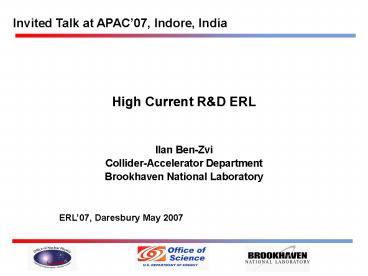High Current R PowerPoint PPT Presentation
1 / 34
Title: High Current R
1
High Current RD ERL
Invited Talk at APAC07, Indore, India
- Ilan Ben-Zvi
- Collider-Accelerator Department
- Brookhaven National Laboratory
ERL07, Daresbury May 2007
2
First objective Electron cooling of RHIC
3
E-cooler 2 passes ERL layout
6
from RHIC
54.5 MeV
54.5 MeV
8
30 MeV
4
4
7
1
to RHIC
5
4.7 MeV
Laser
2
3
- 5, 6. Transport lines to and from
- RHIC,
- Ejection line and beam dump
- Short-cut for independent run of
- the ERL.
- SRF Gun,
- Injection merger line
- SRF Linac two 5-cell cavities
- and 3rd harmonic cavity
- 4, 4. 180 achromatic turns
54 MeV, 5 nC at 9.4 MHz. RF 703.75 MHz. Gun 5 MeV
4
Second objective ERL based eRHIC
High current AND High charge
Presented by Vladimir
5
Other objectives
- Ultra-high power FELs
- Ampere-class current
- nC class bunch charge
- A few micron normalized rms emittance
- ERL storage rings
- 0.1 ampere (sometimes more) current
- 0.1 nC bunch charge
- Emittance as good as possible (sub micron)
- ILC polarized electrons
- 3.2 nC
- Flat beam
- 0.4 micron 4-D emittance
- Other objectives (Compton sources, THz sources,
more)
6
The BNL High-Current RD ERL
- Aimed at pushing the limits for beam current 0.5
amperes - Testing of novel components and techniques
- Superconducting electron gun
- Diamond amplified photocathode
- Z-bend ERL beam merging
- High-current SRF cavity at 703.75 MHz
- Diagnostics and more.
- Working with industry (AES) on many aspects
7
(No Transcript)
8
Control room layout
9
ERL cave layout
10
Some of the installed equipment
11
Some of the parameters of the ERL
- The prototype ERL will demonstrate high current
and new ERL technologies
12
Ampere-class SRF Electron Gun under construction
13
3-D Simulations
VORPAL simulation Courtesy Dimitre Dimitrov
14
(No Transcript)
15
A side view Cathode transporter, SRF gun
16
Transport cart engaged in preparation system or
gun
Collaboration of AES, U. Maryland and BNL
17
Diamond amplified photocathode
Diamond capsule
Diamond window
RF Cavity
Metal coating
Diamond capsule
Secondary electrons
Primary electrons
Laser
Laser window
Hydrogen termination
Photocathode
Courtesy Xiangyun Chang. See talk by Triveni Rao.
18
Gain measured in emission into vacuum
Courtesy X. Chang
19
ERL Ampere-Class Cavity
Fully damped single mode cavity at 703.75
MHz Allows ampere in 3 pass eRHIC. Also used for
electron cooler.
E. Pozdeyev
200 16MeV/pass cavities, measured Cu-model HOM
spectrum 50 foc. and 50 defoc. quadrupoles,
G1.262 T/m 3 acel.-decel. passes, each is 1.3 km
long 28 MHz bunch rep.rate
20
Objectives and challenges of high-current ERL
cavities
- Accelerate a high current in an ERL avoiding
Beam-Breakup - Disposing safely high power of HOMs
- Reduce wake impedance to preserve beam density
- Reduce cryogenic losses
- Be capable of a reasonably good gradient
- Reduce sensitivity to acoustics
- Need single-mode cavity
- Need good conduit for the HOM power
- Need large apertures
- Need low frequency
- Optimum cavity shape
21
BNL 5-cell impedance lower than any other
cavity
Red line MAFIA simulation. Blue points -
measured
Courtesy Ram Calaga
22
High-current ERL cavity
- First of its kind ERL cavity for ultra-high
current (a few amperes CW).
Cavity processed at JLab. Test results 20 MV
reached.
Courtesy Andrew Burrill
23
Courtesy Ram Calaga
24
Vertical Z-bend injection
e-, 4.7 MeV
20º
48 cm
e-, 18 MeV
40 cm
10º
81.6 cm
40 cm
e-, 30 MeV 54.3 MeV
-10º
-20º
1st 5 CELLS CAVITY
SRF Gun
MERGER
1.5 CELL GUN
490 cm
Courtesy Vladimir Litvinenko
25
Emittances evaluation in injection part of ERL,
result of PARMELA simulation
At the linac exit eny1.6 mmmrad enx1.5 mmmrad
Q1.4 nC KEinj2.0 MeV Emax 17 MeV
Courtesy Dmitry Kayran
26
Optimization for the electron cooler, w/ laser
shaping (5 nC)
Courtesy Jorg Kewisch
27
ERL LAYOUT
Courtesy Dmitry Kayran
28
ERL loop lattice
Lattice ? and D functions of the ERL for
different cases of longitudinal dispersions
(DsM56)
No dispersion
Dispersion, m
b, m
Positive longitudinal dispersion
Zero longitudinal dispersion
Courtesy Dmitry Kayran
Negative longitudinal dispersion
29
(No Transcript)
30
Quadrupole magnets
31
Dipoles
32
Beam size evolution in injection line
33
Differential DCCT beam loss measurement
The approach utilizes nulling to attain lt10-6
resolution DCCTs are joined by a single winding
powered by a low-noise current source.
Courtesy Peter Cameron
34
Acknowledgements
- V. Litvinenko
- R. Calaga
- E. Pozdeyev
- D. Kayran
- J. Kewisch
- T. Rao
- X. Chang
- P. Cameron
- AES
- Many others
Thanks for your patience
Work done under the auspices of the US
Department of Energy

